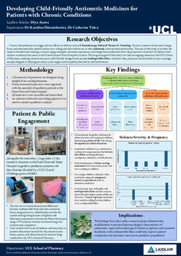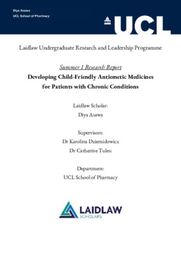Laidlaw Final Reflection
Looking back at my experience as a UCL Laidlaw Scholar, beginning from the first residential all the way up to the final Leadership-in-Action project, it has been a privilege to connect with so many driven, inspiring students across the Laidlaw Scholars Network while developing my research, communication, and leadership skills along the way.
As a UCL Laidlaw Scholar, I spent my first summer interviewing families of paediatric cancer patients at Great Ormond Street Hospital and conducting thematic analysis, writing a 3000-word report which supported a UCL grant application for developing child-friendly drug formulations. Designing and conducting the interviews taught me to approach my research and analysis with greater sensitivity, especially since it was important to create a safe space for vulnerable patients and families to share deeply personal experiences. I learnt about the importance of public engagement and balancing scientific objectives with the well-being of patients. I also learnt that ethical leadership in medicine involves placing the patient at the heart of the research and presenting findings with transparency. Although my project was based in London, I came across several academic studies highlighting how healthcare challenges such as poor drug palatability and treatment adherence negatively affect patients globally. These insights taught me to become more conscious of the cultural and social context in which medical treatments are delivered. Going forward, I will actively seek research opportunities that are more patient-focused. I would also like to remain involved in public and patient engagement opportunities to ensure that my research ethically addresses real-world problems and drives impactful change for underserved patients.
During my LiA Experience in the second summer, I volunteered as a teaching assistant with Teach For India, spending 6 weeks at a school in Mumbai to support underprivileged students facing child abuse and poverty, which deepened my understanding of what it means to be a global citizen. During this project, I supported a Grade 3 classroom of 40 students, teaching Maths, English, and General Studies through interactive lessons, creative writing, reading sessions, numeracy & problem-solving tasks, and skills workshops based on the school’s curriculum. The experience taught me about various aspects of ethical leadership such as starting with small and consistent actions, embracing vulnerability, learning from mistakes, and creating a safe space for trust and collaboration. Immersing myself in a new context made me more aware of systemic inequalities within India and helped me understand the impact of cultural sensitivity, resilience, and patience on students’ education and wellbeing. Going forward, I am excited to continue developing these skills by actively engaging with new perspectives and ideas that challenge my existing assumptions.
The residential workshops, the Oxford Ethical Leadership programme, and the annual conference in Leeds were all incredible ways to connect with fellow Laidlaw Scholars from UCL and each of the partner universities while developing a deeper understanding of meaningful leadership. It was especially inspiring to see the unique perspectives that everyone brought to their own research. The overall structure of the programme allowed me to directly apply insights from these experiences to my research and LiA project, and it was particularly fulfilling to see the first-hand benefits of values-based leadership and trial-and-error under uncertainty. For instance, during the first residential weekend, I learnt that kindergarten students are usually more likely to outperform adults in the marshmallow-spaghetti challenge under time pressure since they spend less time planning and more time experimenting, building, and learning from trial-and-error. I decided to apply this mindset to my own LiA project, where I experimented with different teaching styles and consistently asked the class teacher and the children for feedback, introducing new methods such as storytelling, props, and interactive tasks if the children did not clearly understand certain topics. This method helped me adapt and identify areas for improvement quickly. It also encouraged me to act on my core values such as patience, empathy, and integrity, giving me a clearer understanding of my own leadership style and personal growth.




Please sign in
If you are a registered user on Laidlaw Scholars Network, please sign in